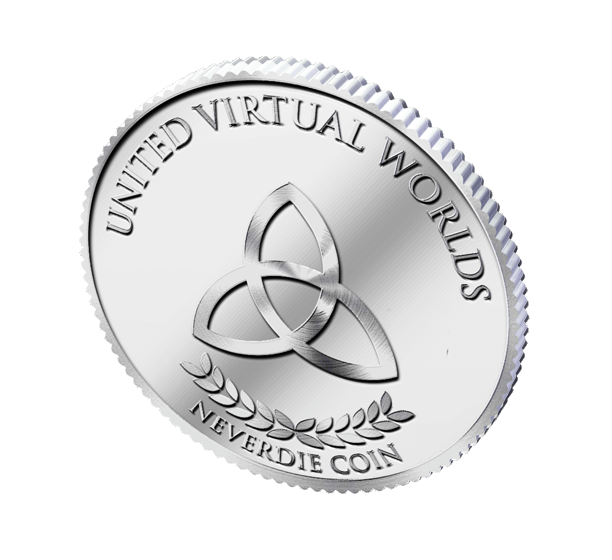 EMERGING TECH
EMERGING TECH
 EMERGING TECH
EMERGING TECH
 EMERGING TECH
EMERGING TECH
Virtual worlds may make way for virtual jobs in the future and Jon “Neverdie” Jacobs, chief executive of Neverdie Studios, believes the answer will come in the form of digital currencies.
To make this happen, Jacobs and Neverdie have been running a crowdsale of virtual tokens that will be used to fund virtual world economies – meaning that players in virtual worlds can make actual money playing games – and also to fund the development teams that write software and operate servers.
Using a foundation already pioneered by blockchain cryptocurrency technology, Neverdie Studios is using the Ethereum blockchain to build and do a crowdsale of two online currency tokens: the Neverdie Coin and the Teleport Tokens.
Early this morning, the crowdsale of Neverdie Coins ended with the sale of more than 17 million coins. The name “Neverdie” refers to how many games have a “death” mechanic, where a character can be killed and must resurrect. Much like putting a quarter into an arcade machine, a Neverdie Coin can be used to give a player an extra life, thus providing the coins a basic utility.
To date, the crowdsale has raised approximately 14,400 Ethereum, the cryptocurrency Neverdie and Teleport is built on, coming out to about $32.2 million.
The other currency, Teleport Tokens, had its crowdsale extended to Aug. 31 to allow the tokens to mature and build a larger audience. The vision is to support a major project spearheaded by Jacobs to provide a way to fund virtual worlds and create job economies. Fitting to their name, TT would be used in online virtual worlds to allow for instant teleportation between distant areas.
Teleport Tokens are designed to reward players for playing in virtual worlds. General activity during gameplay produces the tokens: As players explore, kill monsters, mine and gather materials, build, craft items and complete odd jobs and quests they will receive “shards” that can be transformed into full TT.
“Tokens are crafted and manufactured by the players — mined, traded and crafted — except for the ones that will be sold in the initial crowdsale,” Jacobs said. “During gameplay they must actually be made through traditional online games and virtual world-type crafting and gathering. We are not introducing a payment system for virtual worlds and online games. This is basically connecting true gameplay. We are gamifying ‘mining’ of the cryptocurrency.”
Players who do not consume TT for their natural utility – to pay for the instant transport around worlds – can trade them on cryptocurrency exchanges for real world money. As a result, players who earn TT in virtual worlds can make playing and operating in a virtual world a job that pays actual money.
Jacobs told SiliconANGLE that this net effect of providing a job economy for virtual worlds is his intent. He hopes that it will provide a way for virtual worlds, massively multiplayer online role-playing games and virtual reality games to monetize the activity of visitors and players in a way that generates stable economies.
“The Teleport Token is trailblazing a new path for virtual world monetization,” said Jacobs, “one that will nurture a virtual goods economy by using interoperable tokens that can be traded peer-to-peer on the blockchain and used as a payment system for building and discovery in virtual worlds.”
When a Teleport Token is consumed by a player, part of its value is redistributed back into the virtual world so that that it can be “mined” again by other players playing the game. Other portions of that value go to the developer of the virtual world to help pay for the operation and development of the game. And some of the is spread out into the network to fund grants for future games voted on by owners of the tokens.
Teleport Tokens also provide a cross-platform economy because they exist outside of the virtual worlds that employ them. Because TT are a token on the Ethereum blockchain, a virtual currency that trades in dollar value in its own right, they can be exchanged between different virtual worlds or games.
This means that games and virtual worlds published by Neverdie Studios, although separate in its base of players, and other publishers can all participate in the Teleport Token economy.
To this end, Neverdie forged an alliance with game developer and massively multiplayer online role-playing game icon Richard Garriot, also known as “Lord British,” who is an adviser to Neverdie. Under the deal, Garriot will include the use of Teleport Tokens in his upcoming game “The Shroud of the Avatar.”
“With Teleport Token, we’ve created a way for players to earn dividends for discovering, building and contributing to virtual worlds,” said Garriott. “Neverdie pays a minimum wage of $0.25 an hour, which is higher than minimum wage in many countries around the world.”
In order to kickstart an economy using Teleport Tokens, Jacobs said that the first project to use Teleport Tokens as an economic incentive will be “The Ethereum Teleporter,” a virtual reality equivalent of the Egyptian Pyramids. The great Teleporter structure will be built entirely by the efforts and virtual sweat of players and Jacobs hopes it will become VR’s first “world wonder.”
To begin, Neverdie has pooled a total of $10 million in gamified wages into the Ethereum Teleporter game world that will be distributed to player workers as they go about their daily virtual lives. Since everything a player does in-world produces a portion of what can be transformed into a Teleport Token, every player doing anything in that virtual world participates in that economy.
There’s more information about Neverdie Coins and Teleport Tokens on the Neverdie Studios website and in Neverdie’s extremely detailed whitepaper on the subject.
THANK YOU